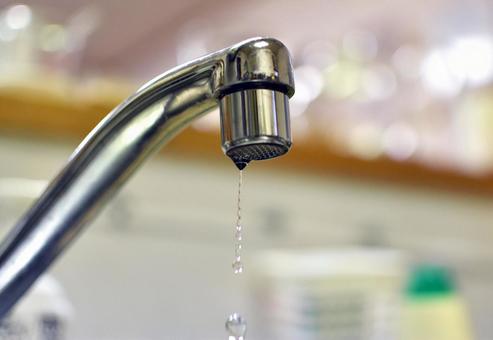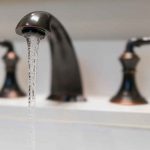Low water pressure in your kitchen sink can be frustrating. It even can be one of the lousiest home tasks to deal with in a home.
The fact is that there are many reasons why water pressure is going down in your kitchen, and we will cover them in this article.
Let’s read on to answer, What are the causes of low water pressure in kitchen sinks?

Causes of Low Water Pressure in Kitchen Sink?
Now, we will identify seven potential causes of low water pressure in your kitchen sink.
Clogged Aerator
Your kitchen faucet’s aerator is the screen that should cover the faucet spout’s end. In other words, it is your kitchen faucet’s last part where it comes into contact with water before flowing into your sink.
The role of the faucet aerator is to be the last filter for water and is also responsible for managing the water’s flow.
Therefore, it is not surprising that mineral build in this part leads to its blockage. This condition is in areas that use hard water, which has high mineral content.
Faulty Faucet
The problem isn’t just with the cartridge and aerator. Instead, something can be wrong with your kitchen faucet, which often requires you to replace your faucet.
Of course, it is possible to change the parts of your faucet, but those can differ a lot based on each model.
Clogged Cartridge
You can find the cartridge at the base of your faucet’s handle.
This part is responsible for controlling the opening valves, allowing the water to flow through your faucet. The cartridge also helps prevent any leak or malfunction in general.
However, a buildup of mineral deposits can also clog the cartridge, decreasing the water pressure in your kitchen sink.
Blocked Water Supply Line
If the low water pressure problem is not related to your kitchen faucet, chances are the blocked water supply line is the answer you are looking for.
The accumulation of debris can clog the plumbing and pipes of your house, and you often have a hard time dealing with it. In this case, the chances are high that you will need help from a professional.
Pipe Leaks
If there is a pipe leak somewhere in your supply, it can also lead to a drop in water pressure in your kitchen.
The pipe leak can happen anywhere, making it difficult for you to locate it. If not detected in time, it can cause severe damage to the structure of your home, causing you to do a sizable renovation to fix it.
In this case, the best and only workaround is to make a call to a trusted plumber. He will inspect for the pipe leak on your behalf immediately.
Pressure Reducing Valve Issues
The pressure-reducing valve is responsible for controlling the water pressure from the water that comes from the municipal supply. You can adjust the water pressure from this valve by loosening the screw on its top.
It features a bell shape and is typically located on the incoming water line, but its exact location may vary a bit.
Related: https://www.scratchkitchensalem.com/why-would-water-pressure-be-low-in-just-one-faucet/
Sediment Accumulates in Your Water Heater
If you notice that the pressure drop only happens with hot water and the same does not occur with cold water, the problem may be with your water heater.
A buildup of scale in your water heater is also common. Therefore, taking care of your water heater regularly and properly is essential.
In most cases, it is reasonable to flush your water heater every half year. However, you may want to flush it more often if you live in an area with hard water with high mineral content.
Flushing your water heater periodically ensures it doesn’t affect the water pressure in your kitchen sink and allows it to last longer than you expect. (See more on Youtube)
FAQs
Do I Need A Plumber To Flush My Water Heater?
Flushing a water heater is common for any homeowner, and you can do it once or twice a year. But if your water heater is so scaled that the hot water pressure drops, we recommend getting the help of a trusted plumber.
What Is Normal Water Pressure?
Water pressure is measured in psi, and the normal pressure in homes should range from 45 to 80 psi.
Conclusion
There are many causes of low water pressure in the kitchen sink. So don’t sweat it if you notice your water pressure going down in the kitchen.
By pinpointing the exact cause, you know what to do to fix the problem. If fixing your kitchen sink is difficult for you, it’s best to get the help of a professional.




